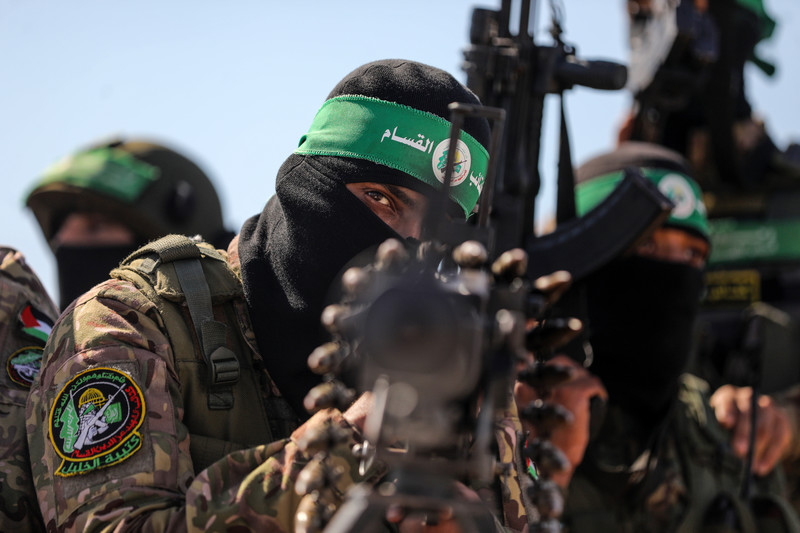
Palestinian fighters with the Qassam Brigades, the military wing of Hamas, pictured in Gaza in July. Photo: Majdi Fathi/APA.

Orinoco Tribune – News and opinion pieces about Venezuela and beyond
From Venezuela and made by Venezuelan Chavistas

Palestinian fighters with the Qassam Brigades, the military wing of Hamas, pictured in Gaza in July. Photo: Majdi Fathi/APA.
The resistance group has called on Egypt, Qatar, Turkiye, Russia, and the UN to act as guarantors of the truce deal, stressing that its demands cannot be ‘compromised’ and that any obstacles can be ‘ironed out’ after negotiations start
Hamas, on 6 February, responded to a ceasefire offer presented by Qatari and Egyptian mediators with a counterproposal that calls for a 135-day truce that includes a three-step prisoner exchange process, the cessation of all military operations by the warring sides, the complete withdrawal of Israeli troops from Gaza, the unrestrained entry of humanitarian aid to the strip, and an end to violent settler incursions into Al-Aqsa Mosque.
“This agreement aims to stop mutual military operations between the parties, reach a complete and sustainable calm, exchange prisoners between the two parties, end the siege on Gaza, rebuild, return residents and displaced people to their homes, and provide shelter and relief for all residents in all areas of the Gaza Strip,” the Hamas statement reads.
The proposal calls on Egypt, Qatar, Turkiye, Russia, and the UN to act as guarantors of the agreement.
Divided into three 45-day stages, the prisoner exchange deal would first see the release of all Israeli women captives, males under 19, the elderly, and the sick. The remaining male captives would be freed during the second phase, and the remains of those killed in fighting would be exchanged in the third phase.
The resistance group also wants the release of 1,500 prisoners, a third of whom would be selected from a list of Palestinians handed life sentences by Israel.
During the first stage, Hamas calls for increasing humanitarian aid deliveries to meet the needs of Gazans; the reconstruction of hospitals, homes, and facilities; a repositioning of Israeli forces “far outside” the populated areas in Gaza to allow for the safe transfer of prisoners; and a stop to aerial reconnaissance operations by Tel Aviv.
Before the second stage can start, Hamas says indirect discussions must continue with the aim of returning “to a state of complete calm.” During these 45 days, Israeli troops would need to withdraw “far outside the borders of all areas of the Gaza Strip” while the reconstruction of homes and vital infrastructure is expected to expand.
“[The third] stage aims … to continue the humanitarian procedures for the first and second stages, in accordance with what will be agreed upon in the first and second stages,” the Hamas statement reads.
Scores of Gazans Killed After Qatar Says Israel Approved Ceasefire Plan
Other demands in the addendum to the proposal include guarantees from Israel to refrain from re-arresting released Palestinian and Arab prisoners for the original charge of their detention, to improve living conditions in Israeli prisons, to ensure freedom of movement for all citizens in Gaza and the reopening of all crossings into the strip, to allow the delivery of tens of thousands of temporary homes and shelter tents, and to allow the resumption of all humanitarian services in Gaza – in particular by the UN Relief and Works Agency for Palestine Refugees in the Near East (UNRWA).
Hamas has also explicitly called for an end to violent settler incursions into Al-Aqsa Mosque in occupied East Jerusalem and “returning the conditions in Al-Aqsa to what they were before 2002.”
Speaking to Al-Jazeera on Wednesday, Muhhamed Nazzal, a senior member of Hamas’ political bureau, said nothing within the proposal can be “compromised.”
“The Israeli killing machine must be brought to a halt. We wish to see Israeli occupation forces withdraw from the Gaza Strip entirely. Our response is realistic, and our demands are reasonable,” Nazzal said. “We expect a negotiation to start. Once it starts, any obstacles can be ironed out along the way to reach a final agreement, whereby we can dot the Is and cross the Ts,” he added.
In response to the comprehensive proposal, Israeli officials told Ynet on Wednesday that “they cannot accept an end to the war.” For its part, the office of Prime Minister Benjamin Netanyahu told the Times of Israel that Tel Aviv “does not have a response to Hamas’ demands beyond its statement last night indicating that it was studying the proposal.”
Netanyahu is set to meet with US State Secretary Antony Blinken, who arrived in Israel after visiting Saudi Arabia and Egypt, on Wednesday.